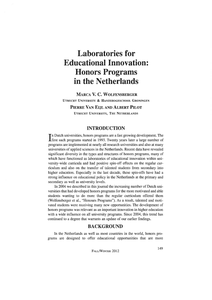This book examines the much-debated question of how to unleash the potential of young people with promising intellectual abilities and motivation. It looks at the increasingly important topic of excellence in education, and the shift in focus towards the provision of programs to support talented students in higher education. It provides a systematic overview of programs for talented students at northern European higher education institutions (HEIs). Starting in the Netherlands, where nearly all HEIs have developed honors programs over the past two decades, the book explores three clusters of countries: the Benelux, the Nordic and the German-speaking countries. For each of these countries, it discusses the local culture towards excellence, the structure of the education system, and the presence of honors programs. In total, the book reviews the special talent provisions for nearly four million students at 303 higher education institutions in eleven countries. In addition, it offers an analysis of the reasons to develop such programs, a look into the future of honors education and a practical list of suggestions for further research.The Sirius Program assigned Marca Wolfensberger to carry out this research.
LINK
The Spring of 2020 brought many disruptions to our professional and personal lives due to the COVID-19 pandemic that forced worldwide mid-semester campus closures; pivoting of traditional, face-to-face classes to remote teaching and learning; and postponements or cancellations of conferences, workshops, and other professional development events. One example of the breakdown of scheduled opportunities for us as honors colleagues to gather in-person to enhance our practices and strengthen our community was the cancellation of the 2020 International Conference on Talent Development and Honors Education in Groningen, the Netherlands, originally slated for June 10-12 but moved to June 16-18, 2021. Immediately following the 2020 conference, we (the authors) had planned to offer the fifth Honors International Faculty Institute (HIFI), an international and highly interactive occasion for honors and talent development teachers, researchers, and leaders to engage in presentations, experiential activities, place-as-text explorations, collaborative group work, reflective exercises, and showcases designed to improve teaching, learning, and programming in honors. Suddenly, the coronavirus upended our world, and we had to reimagine the institute that we had previously organized four times alternately at Hanze University of Applied Sciences (Netherlands) and Texas Christian University (USA). Putting aside the disappointment of the moment and recognizing the value of coming up with an alternative to HIFI that would ensure the safety and health of our honors colleagues, we decided to create a fully online version with free registration to encourage participation and create resources accessible to all members of our international community. We wanted to highlight the challenges of how all of us unexpectedly had to pivot to remote teaching and learning as the global pandemic intensified, but we also wanted to share information, experiences, and models that could open new avenues for operationalizing online honors education more generally beyond the COVID-19 crisis. We wanted, in other words, to explore how honors pedagogy could (and maybe should) be adapted to the increasingly online world of primary, secondary, and higher education. Thus, HIFLO 2020 was born! HIFLO stands for Honours International Faculty Learning Online.
DOCUMENT
In Dutch universities, honors programs are a fast growing development. Thefirst such programs started in 1993. Twenty years later a large number ofprograms are implemented at nearly all research universities and also at manyuniversities of applied sciences in the Netherlands. Recent data have revealedsignificant diversity in the types and structures of honors programs, many ofwhich have functioned as laboratories of educational innovation within university-wide curricula and had positive spin-off effects on the regular curriculumand also on the transfer of talented students from secondary intohigher education. Especially in the last decade, these spin-offs have had astrong influence on educational policy in the Netherlands at the primary andsecondary as well as university levels.
DOCUMENT
